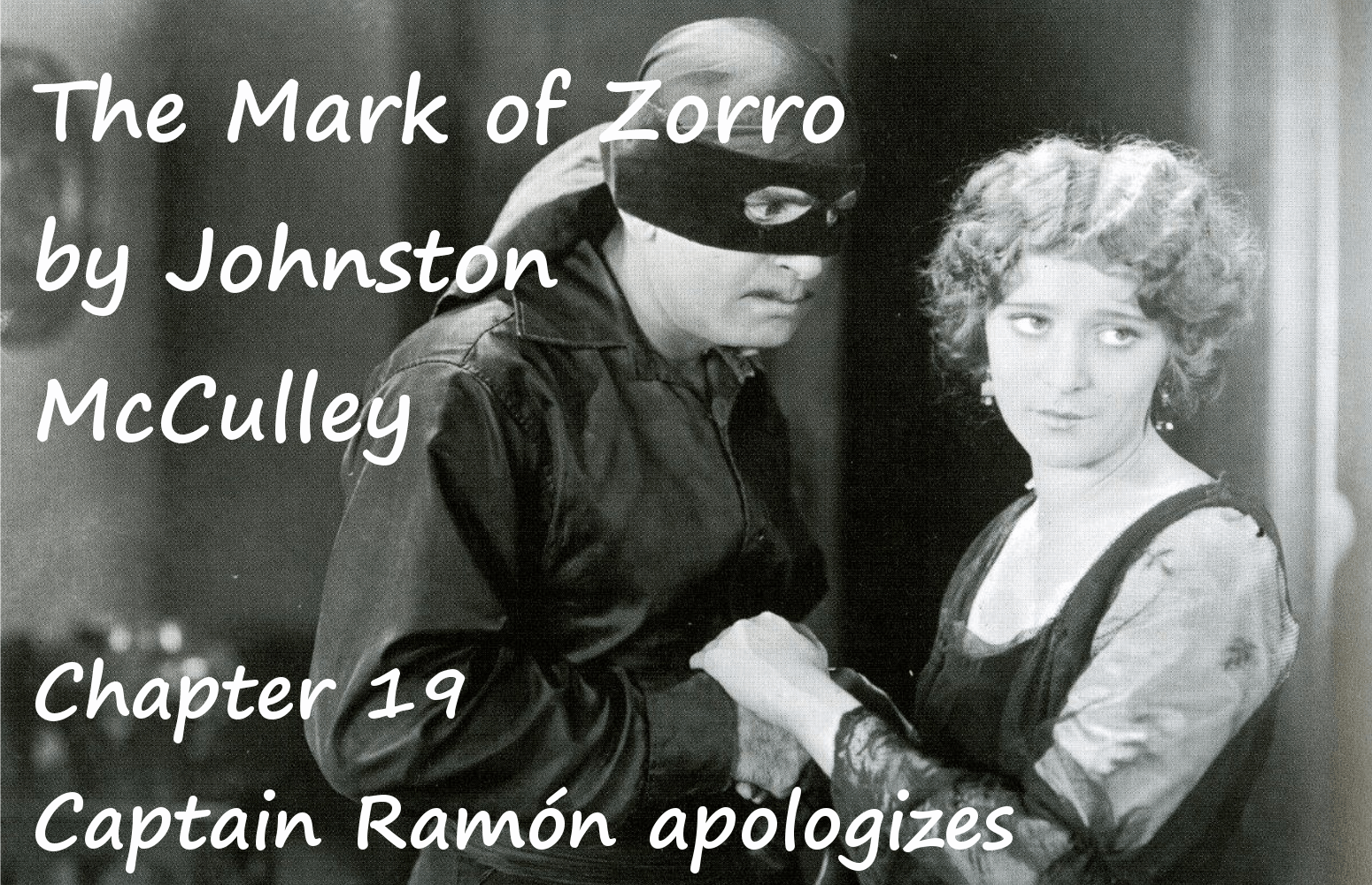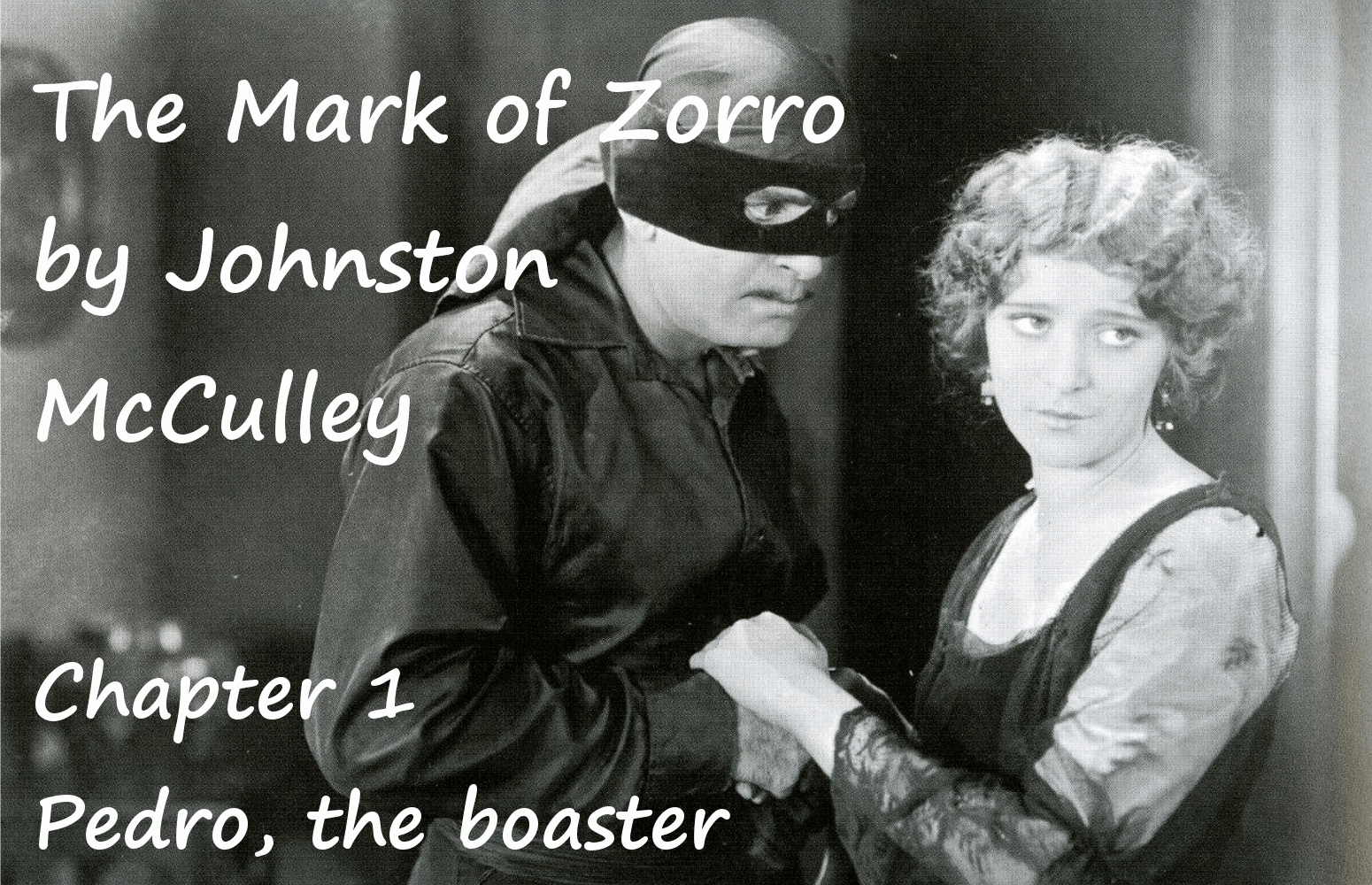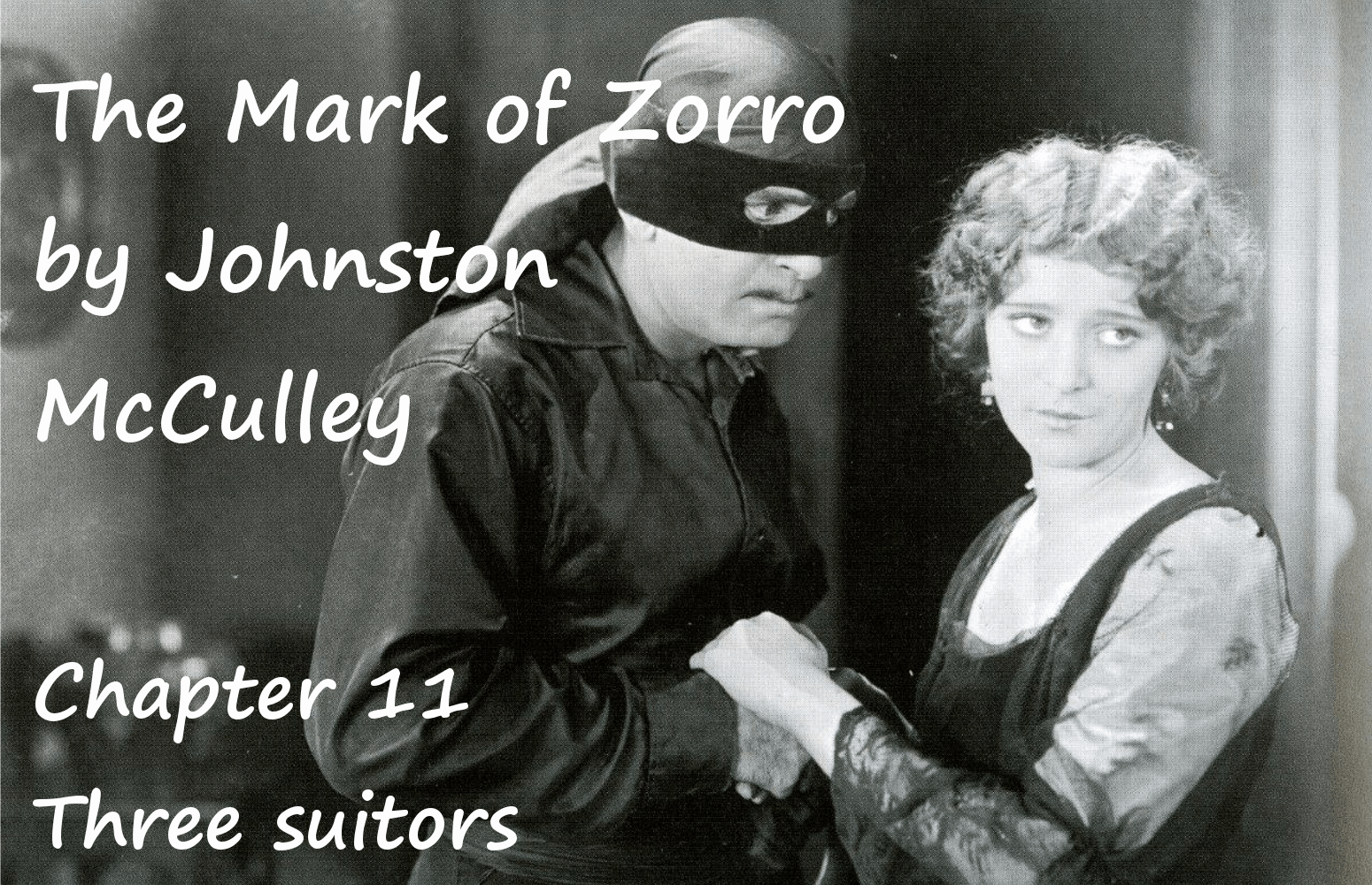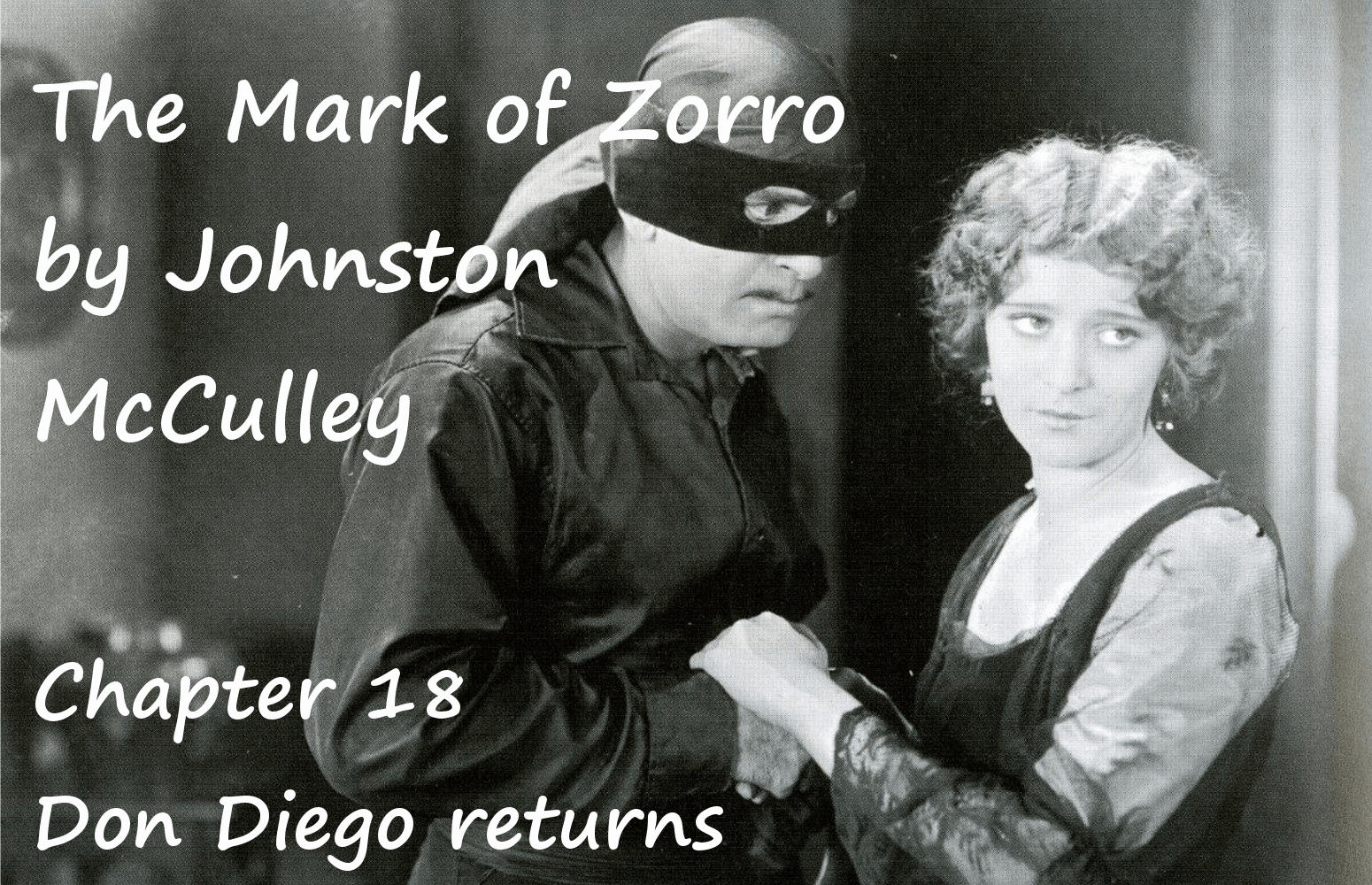The Mark of Zorro chapter 19 Captain Ramón apologizes
The Mark of Zorro chapter 19 Captain Ramón apologizes
Author McCulley, Johnston, 1883-1958
Title The Mark of Zorro
Note Published serially under the title: The curse of Capistrano.
Language English
Copyright Status Public domain in the USA.
“Captain Ramón is a beast!” the girl said, in a voice not too loud.
“He is a worthless fellow,” Don Diego agreed.
“He—that is—he wished to kiss me,” she said.
“And you did not let him, of course.”
“Señor!”
“I—confound it, I did not mean that! Certainly you did not let him! I trust that you slapped his face.”
“I did,” said the señorita. “And then he struggled with me, and he told me that I should not be so particular, since I was daughter of a man who stood in the bad graces of the governor.”
“Why, the infernal brute!” Don Diego exclaimed.
“Is that all you have to say about it, caballero?”
“I cannot use oaths in your presence, of course.”
“Do you not understand, señor? This man came into your house, and insulted the girl you have asked to be your wife!”
“Confound the rascal! When next I see his excellency, I shall ask him to remove the officer to some other post.”
“Oh!” the girl cried. “Have you no spirit at all? Have him removed? Were you a proper man, Don Diego, you would go to the presidio, you would call this Captain Ramón to account, you would pass your sword through his body, and call upon all to witness that a man could not insult the señorita you admired and escape the consequences.”
“It is such an exertion to fight!” he said. “Let us not speak of violence. Perhaps I shall see the fellow and rebuke him.”
“Rebuke him!” the girl cried.
“Let us talk of something else, señorita. Let us speak of the matter regarding which I talked the other day. My father will be after me again soon to know when I am going to take a wife. Cannot we get the matter settled in some manner? Have you decided upon the day?”
“I have not said that I would marry you,” she replied.
“Why hold off?” he questioned. “Have you looked at my house? I shall make it satisfactory to you I am sure. You shall refurnish it to suit your taste, though I pray you do not disturb it too much, for I dislike to have things in a mess. You shall have a new carriage and anything you may desire.”
“Is this your manner of wooing?” she asked, glancing at him from the corners of her eyes.
“What a nuisance to woo!” he said. “Must I play a guitar, and make pretty speeches? Can you not give me your answer without all that foolishness?”
She was comparing this man beside her with Señor Zorro, and Don Diego did not compare to him favorably. She wanted to be done with this farce, to have Don Diego out of her vision, and none but Señor Zorro in it.
“I must speak frankly to you, caballero,” she said. “I have searched my heart, and in it I find no love for you. I am sorry, for I know what our marriage would mean to my parents, and to myself in a financial way. But I cannot wed you, Don Diego, and it is useless for you to ask.”
“Well, by the saints! I had thought it was about all settled!” he said. “Do you hear that, Don Carlos? Your daughter says she cannot wed with me—that it is not in her heart to do so.”
“Lolita, retire to your chamber!” Doña Catalina exclaimed.
The girl did so, gladly. Don Carlos and his wife hurried across the room and sat down beside Don Diego.
“I fear you do not understand women, my friend,” Don Carlos said. “Never must you take a woman’s answer for the last. She always may change her mind. A woman likes to keep a man dangling, likes to make him blow cold with fear and hot with anticipation. Let her have her moods, my friend. In the end, I am sure, you shall have your way.”
“It is beyond me!” Don Diego cried. “What shall I do now! I told her I would give her all her heart desired.”
“Her heart desires love, I suppose,” Doña Catalina said, out of the wealth of her woman’s wisdom.
“But certainly I shall love and cherish her. Does not a man promise that in the ceremony? Would a Vega break his word regarding such a thing?”
“Just a little courtship,” Don Carlos urged.
“But it is such a nuisance!”
“A few soft words, a pressure of the hand now and then, a sigh or two, a languishing look from the eyes—”
“Nonsense!”
“It is what a maiden expects. Speak not of marriage for some time. Let the idea grow on her—”
“But my august father is liable to come to the pueblo any day and ask when I am to take a wife. He has rather ordered me to do it.”
“No doubt your father will understand,” said Don Carlos. “Tell him that her mother and myself are on your side and that you are enjoying the pleasure of winning the girl.”
“I believe we should return to the hacienda to-morrow,” Doña Catalina put in. “Lolita has seen this splendid house, and she will contrast it with ours. She will realize what it means to marry you. And there is an ancient saying that when a man and a maid are apart they grow fonder of each other.”
“I do not wish to have you hurry away.”
“I think it would be best under the circumstances. And do you ride out, say, in three days, caballero, and I doubt not you will find her more willing to listen to your suit.”
“I presume you know best,” Don Diego said. “But you must remain at least until to-morrow. And now I think I shall go to the presidio and see this Captain Ramón. Possibly that will please the señorita. She appears to think I should call him to account.”
Don Carlos thought that such a course would prove disastrous for a man who did not practice with the blade and knew little of fighting, but he refrained from saying so. A gentleman never intruded his own thoughts at such a time. Even if a caballero went to his death, it was all right so long as he believed he was doing the proper thing, and died as a caballero should.
So Don Diego went from the house and walked slowly up the hill toward the presidio building. Captain Ramón observed his approach, and wondered at it, and snarled at the thought of coming to combat with such a man.
But he was cold courtesy itself when Don Diego was ushered into the comandante’s office.
“I am proud to know you have visited me here,” he said, bowing low before the scion of the Vegas.
Don Diego bowed in answer, and took the chair Captain Ramón indicated. The captain marveled that Don Diego had no blade at his side.
“I was forced to climb your confounded hill to speak to you on a certain matter,” Don Diego said. “I have been informed that you visited my house during my absence, and insulted a young lady who is my guest.”
“Indeed?” the captain said.
“Were you deep in wine?”
“Señor?”
“That would excuse the offense in part, of course. And then you were wounded, and probably in a fever. Were you in a fever, captain?”
“Undoubtedly,” Ramón said.
“A fever is an awful thing—I had a siege of it once. But you should not have intruded upon the señorita. Not only did you affront her, but you affronted me. I have asked the señorita to become my wife. The matter—er—is not settled as yet, but I have some rights in this case.”
“I entered your house seeking news of this Señor Zorro,” the captain lied.
“You—er—found him?” Don Diego asked.
The face of the comandante flushed red.
“The fellow was there, and he attacked me,” he replied. “I was wounded, of course, and wore no weapon, and so he could work his will with me.”
“It is a most remarkable thing,” observed Don Diego, “that none of you soldiers can meet this Curse of Capistrano when you can be on equal terms. Always he descends upon you when you are helpless, or threatens you with a pistol while he fights you with a blade, or has his score of men about him.
“I met Sergeant Gonzales and his men at the hacienda of Fray Felipe last night, and the big sergeant told some harrowing tale of the highwayman and his score of men scattering his troopers.”
“We shall get him yet!” the captain promised. “And I might call your attention to certain significant things, caballero. Don Carlos Pulido, as we know, does not stand high with those in authority. This Señor Zorro was at the Pulido hacienda, you will remember, and attacked me there, emerging from a closet to do it.”
“Ha! What mean you?”
“Again, on last night, he was in your house while you were abroad and the Pulidos were your guests. It begins to look as if Don Carlos has a hand in the work of the Señor Zorro. I am almost convinced that Don Carlos is a traitor, and is aiding the rogue. You had better think twice, or half a score of times, before seeking a matrimonial alliance with the daughter of such a man.”
“By the saints, what a speech!” Don Diego exclaimed, as if in admiration. “You have made my poor head ring with it! You really believe all this?”
“I do, caballero.”
“Well, the Pulidos are returning to their own place to-morrow, I believe. I but asked them to be my guests so they could be away from the scenes of this Señor Zorro’s deeds.”
“And Señor Zorro followed them to the pueblo. You see?”
“Can it be possible?” Don Diego gasped. “I must consider the matter. Oh, these turbulent times! But they are returning to their hacienda to-morrow! Of course, I would not have his excellency think that I harbored a traitor.”
He got to his feet, bowed courteously, and then stepped slowly toward the door. And there he seemed to remember something suddenly, and turned to face the captain again.
“Ha! I am at the point of forgetting all about the insult!” he exclaimed. “What have you to say, my captain, regarding the events of last night?”
“Of course, caballero, I apologize to you most humbly,” Captain Ramón replied.
“I suppose that I must accept your apology. But, please do not let such a thing happen again. You frighten my despensero badly, and he is an excellent servant.”
Then Don Diego Vega bowed again and left the presidio, and Captain Ramón laughed long and loudly, until the sick men in the hospital-room feared that their comandante must have lost his wits.
“What a man!” the captain exclaimed. “I have turned him away from that Pulido señorita, I think. And I was a fool to hint to the governor that he could be capable of treason. I must rectify that matter in some way. The man has not enough spirit to be a traitor!”



